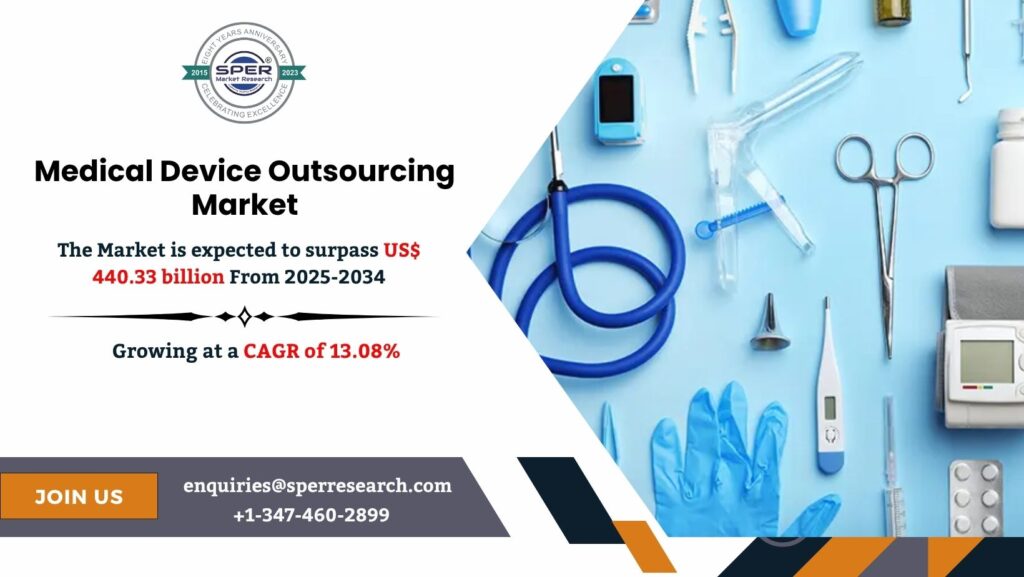
The strategic practice of medical device firms assigning different parts of their product lifecycle, including design, development, manufacture, packaging, testing, regulatory assistance, and distribution, to outside service providers is known as medical device outsourcing. By using this strategy, businesses may access specialised knowledge, optimise resources, shorten time-to-market, and guarantee adherence to strict regulatory requirements. Due to the growing complexity of devices, the need for cost-effectiveness, and the speed at which technology is developing, outsourcing has emerged as a crucial element of the global medical device market. From low-cost production to material innovation and miniaturisation, contract manufacturers and service providers are essential to OEMs (Original Equipment Manufacturers).
According to SPER Market Research, ‘Medical Device Outsourcing Market Growth, Size, Trends Analysis – By Service, By Application, By Class – Regional Outlook, Competitive Strategies and Segment Forecast to 2034’ state the Global Medical Device Outsourcing Market is estimated to reach USD 440.33 billion by 2034 with a CAGR of 13.08%.
Drivers:
A number of interrelated factors are the main drivers of medical device outsourcing’s growth. The growing complexity of medical devices, which necessitates specialised knowledge and cutting-edge manufacturing processes that many OEMs do not have on staff, is one of the main causes. Such competencies can be accessed through outsourcing without requiring a significant financial outlay. Another important consideration is cost-efficiency; by taking advantage of the economies of scale and labour cost advantages provided by contract manufacturers, particularly in emerging countries, outsourcing enables businesses to lower production and operating expenses. Furthermore, in a highly competitive and innovation-driven industry, the need to expedite time-to-market for new goods pushes businesses to outsource non-core tasks, freeing up internal resources for strategic planning, design, and research.
Request a Free Sample Report: https://www.sperresearch.com/report-store/medical-device-outsourcing-market-future-outlook?sample=1
Restraints:
Medical device outsourcing is subject to many limitations that may impede its expansion. One significant issue is the loss of control over intellectual property and quality, which can jeopardise a company’s product safety and brand reputation. When working with highly regulated and complicated devices, it can be difficult to ensure consistent quality across geographically distant production partners. Another crucial concern is regulatory compliance; outsourcing partners are required to follow strict and changing international standards (such as FDA, MDR, and ISO), and any breaches could result in expensive recalls or legal repercussions for the original equipment manufacturer. Furthermore, supply chain interruptions—such as those brought on by pandemics, transportation problems, or geopolitical tensions—can have a big impact on delivery and production schedules. Time zone discrepancies and language limitations can also hinder communication.
Medical device outsourcing is increasing globally due to rising demand for cost-effective, high-quality, and innovative healthcare solutions. Companies are leveraging specialized third-party expertise to accelerate product development and meet regulatory requirements efficiently. Some of its key players are – Celestica Inc, FLEX LTD, ICON plc, IQVIA Inc, Jabil Inc, Med pace.
For More Information, refer to below link: –
Medical Device Outsourcing Market Future
Postpartum Health Supplements Market
Related Reports:
Nucleic Acid Amplification Testing Market
Follow Us –
LinkedIn | Instagram | Facebook | Twitter
Contact Us:
Sara Lopes, Business Consultant — USA
SPER Market Research
enquiries@sperresearch.com
+1–347–460–2899





